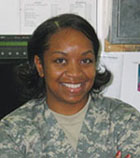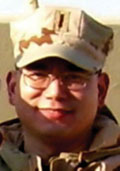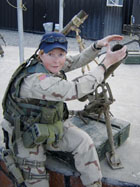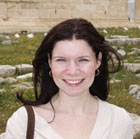By Ron Supan

Major Tykise Hairston, MSN ’06
Hairston currently serves as the Clinical Head Nurse/Nurse Manager of a 20-bed Intermediate Care Ward in Mosul, Iraq, with the 28th Combat Support Hospital out of Fort Bragg, North Carolina. “I am responsible for leading, training, and supervising approximately 15 clinical and administrative staff members,” says Hairston. “We need to provide exceptional care to our U.S. military soldiers, local Iraqi nationals, foreign nationals, third country nationals, and coalition forces.”

Rich Malicdem ’05
Mallicdem is an Ensign with the U.S. Navy, Nurse Corps. He is assigned to the Intensive Care Unit at Naval Hospital in Bremerton, Washington and is deployed in Kuwait at the Expeditionary Medical Facility. He is serving in the Intensive Care Unit, Casualty Receiving, and Multi-Service Inpatient Care Ward caring for sick and injured military personnel from the U.S. and other countries such as Australia, Britain, Japan, and South Korea.
“As a Navy Nurse, I am also entrusted with preparing the Hospital Corpsmen (Medics) for the battlefield by training them in patient care, critical thinking, and performing emergency procedures,” writes Malicdem. His duties sometimes include transporting critical patients via helicopter, MEDEVAC plane, or ambulance to hospitals in Kuwait or even Europe. He also assists the maxillofacial surgeon at the dental clinic performing conscious sedation for operative procedures and patient recovery.
Photo of Jill Murphy, Accel. ’04

Jill Murphy, Accel. ’04
Murphy is currently a second lieutenant in the Army and a nurse on Ward 57 of Walter Reed Army Medical Center, the Army’s “flagship” hospital in Washington, D.C.
Most of the U.S. war casualties end up with Murphy on the Orthopedics and Physical Medicine and Rehabilitation floor at Walter Reed. “Massive blast injuries and gunshot wounds, extensive fractures and amputations are the most common injuries,” she notes. “We work with cutting edge orthopedic technology to piece the soldiers back together and fit them with prostheses after their residual limbs have healed.”
She adds: “Imagine being a nurse on a ward where none of your patients have contributed to their becoming a patient. No overeating or smoking or lack of exercise or poor lifestyle choices contributing to preventable conditions. They were all injured doing something noble and selfless. ”
Murphy went to Afghanistan as a Civil Affairs Team Sergeant soon after graduating from JHUSON in 2004. She spent 11 months in Paktika Province forging relations with the locals and determining the best use of reconstruction funds there.
“It’s humbling, inspiring, emotionally and physically demanding,” she says of her work. “It is sometimes draining dealing with all the shattered bodies, but ultimately, I think it’s the most rewarding job I could possibly have.”

Deborah Schoenfeld, Accel. ’05
Schoenfeld works as a Community Health / Home Visiting Nurse for the Army in Wuerzburg, Germany. Her clients range from expectant parents, to single active duty mothers, to new mothers whose husbands have been deployed to Iraq for a year. Her husband has been in Iraq twice and many of her clients were deploying or redeploying from Iraq.
The “New Parent Education and Support Program,” is a home visitor and community based program that aims to educate new parents and prevent child abuse and neglect. “The Army implemented the program due to the added stress of the military life style and year long deployments,” says Schoenfeld. Military mothers and fathers are young in age (early 20s) or single active duty moms and are thousands of miles away from family and friends back in the United States. “Deployments add additional stress to parenting because in addition to a new baby, new moms—and some-times new dads—are now single parents with a new baby. Often there is a lot of isolation and depression that these new parents deal with. As a home visitor nurse, I am here to help these new parents.”
Military Alumni: Send your news “from the front” for the next issue of Johns Hopkins Nursing to [email protected].